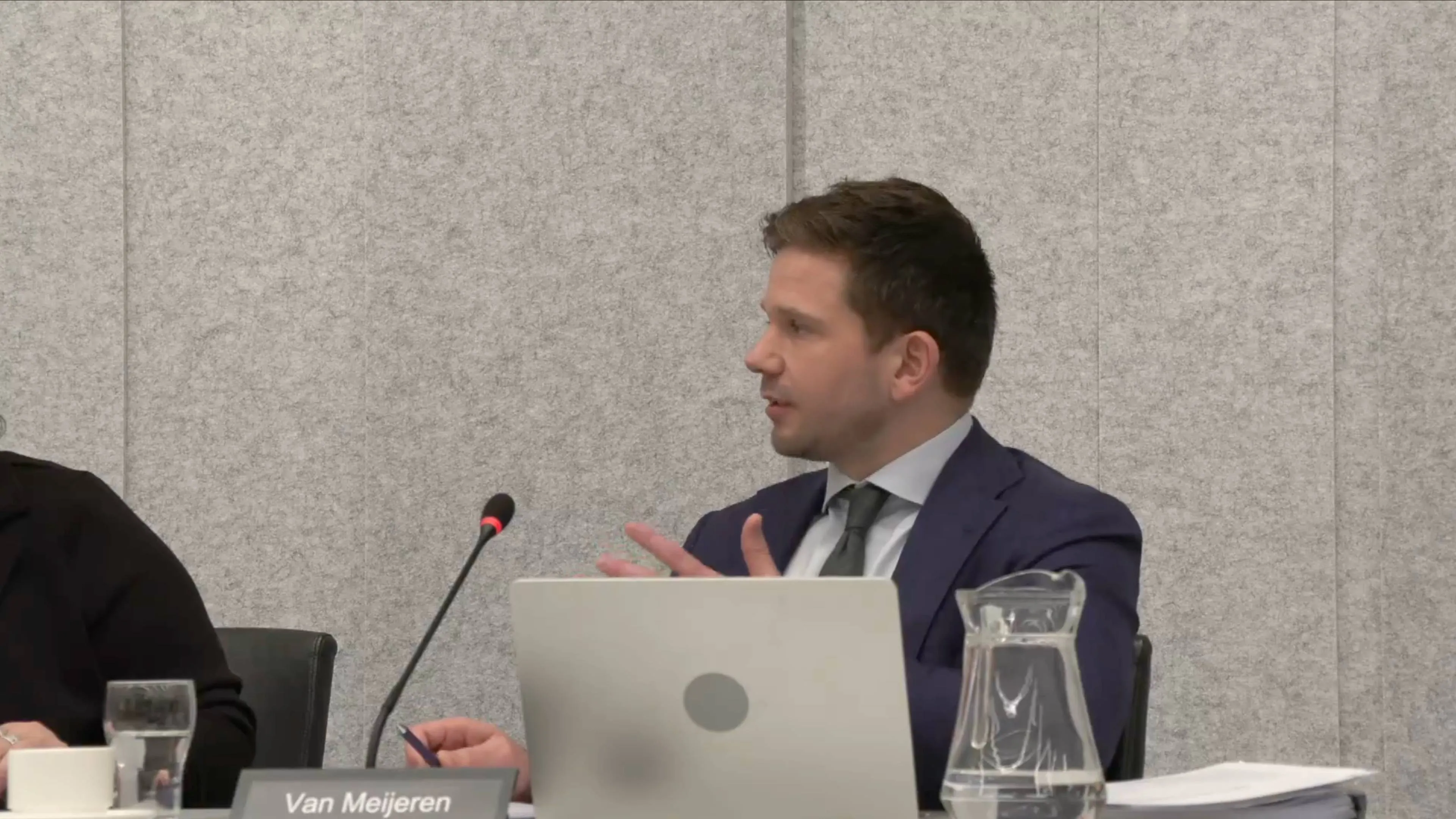Nigel Lawson over schijn en werkelijkheid van het klimaatbeleid
De voorlichting over het klimaatbeleid staat bol van propaganda en desinformatie. Of, hoe het publiek een rad voor de ogen wordt gedraaid.
Onder de titel, 'ABC Interview With Nigel Lawson', publiceerde de 'Global Warming Policy Foundation' (GWPF) de tekst van een interview van de Australische ABC met Nigel Lawson, die er geen doekjes om windt. Hij noemt de klimaathype een geval van collectieve verstandsverbijstering. Dezelfde woorden gebruikte ik meer dan tien jaar geleden op de Nederlandse tv. Het werd mij niet in dank afgenomen. Daarna volgde een informeel Berufsverbot.
Het is een héél lang interview. Ik pik er een aantal krenten uit.
With six months to go until the next global climate treaty talks in Paris, environmentalist and former US vice president Al Gore has declared that ‘the future of the world depends’ on their outcome. Lord Nigel Lawson, former energy secretary in Margaret Thatcher’s government, delivers his assessment of the prospects of the world reaching a new climate deal.
Previous climate conferences, including Copenhagen in 2009, Durban in 2011 and Doha in 2012, failed to reach binding, enforceable and verifiable deals.
Will Paris be different? And if not, what do we do about climate change?
Tom Switzer: Will the UN reach a genuinely global and legally binding deal at Paris later this year?
Lord Lawson: Not a legally binding deal at all, though they’ll no doubt be a wishy washy agreement that everybody’s going to do their best. But nothing will be legally binding. It’s going to basically be a sham.
Tom Switzer: Many climate enthusiasts point to that China/US deal that was reached last November as the way forward. President Obama at Brisbane’s G20 said that ‘if China and the US can agree on this then the world can get this done.’ Is this deal a climate change game changer?
Lawson: No, it was a phoney deal in the first place. There was nothing really agreed. And indeed they were talking about different things. President Obama was talking about CO2, which is a concern for him. I’m not quite clear why, but it is. And the Chinese people were talking about pollution, which has got nothing to do with CO2, and pollution is a problem in Beijing and many other cities, but it’s got nothing to do with CO2. So, they are talking at cross purposes, but it suited both of them to pretend there was an agreement because Obama wanted to present it as a triumph and the Chinese wanted to get the Americans off their backs. So, it suited both sides to pretend there was an agreement, but there wasn’t an agreement at all, and China is still building new coal fired power stations. It’s still overwhelmingly a coal fired electricity producer and using fossil fuels, and intends to continue to do so for the foreseeable future for obvious reasons – in order to power their growth.
Switzer: And the Chinese simply volunteering their vague, detail free, unenforceable promises that its emissions maybe would stop growing after 2030.
Lawson: That’s right, maybe after 2030. It’s their best guess. That’s all they’re saying. Their best guess is that their CO2 emissions will peak at around 2030. Well, that’s not an agreement, that’s not enforceable. That’s absolutely nothing. It is true – and the Chinese make a lot of this – that their carbon intensity is reducing, but their carbon intensity is reducing for two reasons, which all happens for economic development through-out the world.
First of all, you become more efficient in the use of your energy – just as you become more efficient in the use of man power. It’s what we call productivity. The other thing is that, of course, as you develop you tend to shift – and the Chinese are beginning to do this – from an overwhelmingly manufacturing economy to more of a service economy. Of course, the service industries are much less energy intensive than manufacturing. That is something that happens inevitably and there is no overall reduction in the amount of energy use as the economy expands.
Switzer: So, net emissions are escalating in China?
Lawson: That’s right.
Vervolgens wijst Lawson erop dat – in tegenstelling tot wat veelal wordt beweerd – het aandeel duurzame energie in de Chinese energy mix verwaarloosbaar klein is: ongeveer 1%. Ook India zet in op relatief goedkope fossiele brandstoffen. Voor armere landen is dat de enige manier om zich aan de armoede te ontworstelen.
Switzer: Well, let’s turn to the United States. President Obama, as you know, has failed to legislate for a cap and trade carbon tax despite the fact that he had democratic supermajorities in Congress during his first two years in power, yet his administration has regulated coal fired power plants. To what extent do you think this policy is a global trend setter? Is it reducing carbon emissions, Nigel?
Lawson: Carbon emissions are not going to reduce globally, as we were talking about earlier, because of the huge growth in the emerging world. China and India, in particular, but also in many other parts of Asia and Latin America and maybe to some extent in Africa as well. So, they’re not going to stop growing. Therefore I think it is very foolish of the West, and some Western countries – and the United Kingdom is one of them – to cut back on their use of fossil fuels in order to set an example to the rest of the World. The rest of the World are not going to follow their example. All you’re doing is crippling your own economy and also damaging the poor in your own country. So, it doesn’t seem to me to be a very sensible way forward.
And, of course, another thing that has happened is that the idea was that, maybe in the not so distant future, all these other hopelessly uneconomic sources of power like wind power would become economic because the fossil fuel prices would rise. In fact, fossil fuel prices have fallen largely as a result of the shale revolution – the development of shale gas and shale oil around the world. I think that many countries are going to be reluctant – given the lower prices for fossil fuels –in dishing out these huge subsidies, which the wind energy industry and the solar power industry requires. So, it doesn’t add up.
Na aandacht te hebben geschonken aan het Amerikaanse en Britse energiebeleid vervolgde Switzer:
Switzer: Meanwhile, in Australia Tony Abbott, as you are no doubt well aware, is all too often denounced as a denier for repealing the Gillard Labour government’s carbon tax legislation –something that the broadcross of the Australian population wanted at the last election. But the consensus among a lot of the climate enthusiasts here is that Abbott is isolating Australia from the global community on climate change – he’s emerged as some sort of world pariah. Is that how you read Tony Abbott, Nigel?
Lawson: No, I think that the new ‘Church of Climate Change,’ which has got the opinion formers and the intellectual classes over a large swath of the world and the UN leadership are committed to it and so on, they are totally out of step – both with reality and with public opinion. I believe that Tony Abbott is absolutely right to pay more attention to the facts and more attention to public opinion than to this new religion.
Switzer: Nigel, recently the UN’s top climate negotiator, Christina Figurez, she paid a visit to Australia to warn us that we must step away from our alliance on coal exports. Here she is recently responding to the ABC’s Emma Alberici– it’s a question about our Prime Minister. ...
Lawson: No, she is completely wrong. There are some institutions divesting themselves of their coal shares, but for everyone that does that there are others that are anxious to buy them. So, there’s no running away globally from shares in coal mining companies.
It is perfectly true that the Americans have leant on the World Bank and its affiliates not to finance the development of coal fired power stations in the developing world, and that is one of the main reasons why the Chinese have set up this rival International Development Bank to the World Bank. As you may know, the United Kingdom, France and pretty well everybody else has been happy to join, and they will be financing coal fired power stations.
Also, either she doesn’t know or she refuses to tell what is really happening. If you look at the International Energy Agency or if you look at BP – those are the two bodies that try and make correct projections of what is going to happen to energy demand and energy use over the coming 30/40/50 years – they both project an increase in the use of fossil fuels for the obvious reasons that we were talking about earlier.
En natuurlijk kwam ook de kwalijke rol van de BBC als fervent apostel van het broeikasevangelie ter sprake.
Switzer: Let’s change the subject slightly. You are all too often denounced as a climate change sceptic or even a denier, and I understand that the BBC won’t allow you onto their programmes to talk about this issue?
Lawson: That’s right. They did invite me on – I think in February of last year – surprisingly, and there was a howl from all the Greens – some of them vested interests, some of them fanatics – that is was a disgrace that I was allowed on, and I haven’t been allowed on since.
Switzer: Really? But you accept the broad science that there is a link between carbon emissions and warming? You just question the wild predictions and doomsday scenarios, don’t you?
Lawson: Yes. I mean my position is very clear. Of course, I accept that carbon dioxide is a greenhouse gas which – other things being equal – the more that’s put in the atmosphere, the warmer the temperature of the planet will be, and that burning fossil fuels does this.
There are a number of things which are unclear, however. First of all, the other factors which should determine the temperature of the planet. It’s not just carbon dioxide – that’s absurd. There have been fluctuations in the temperature of the earth over millennia, long before we were burning fossil fuels.
The other thing is how big an effect it has, and it’s clear that the computer models which they’ve relied on grossly exaggerated [the effect] because so far this century – we’re 15 years into it, which is quite a reasonable time – although the models predicted that the temperature would accelerate, in fact it’s more or less stopped. It’s a pause, it’s a hiatus. Obviously the sensitivity to this is less than they thought. So, there might well be some warming, but it won’t be very great and it’s nothing that we can’t adapt to, quite apart from the fact that – as I said before and I think it’s most important – that the most important thing is to raise living standards among the desperately poor in the developing world. The best way to do that is through using the cheapest available energy. Now, that might not be carbon based energy forever, but for now and the foreseeable future it is, and I think it is wicked to try and stop that.
Switzer: Well, I mean you’re not alone here. There are many distinguished climate scientists, such as Richard Lindzen from MIT, Judith Curry from Georgia Tech, William Happer at Princeton,Robert Mendelsohnat Yale, John Christy at NASA, Freeman Dyson– he’s a famed physicist. They’ve all in their own ways criticised various aspects of the IPCC’s line on climate change, but they hardly get heard in this debate.
Lawson: Well, that’s right. Some of those you mentioned, including Freeman Dyson, are members of the academic advisory council of my think-tank. One of the points that Freeman Dyson has made a lot, which is absolutely right, is that the biggest impact of increased carbon dioxide in the atmosphere is the greening of the planet. Carbon dioxide is the food for all plant life, and without plant life there wouldn’t be much animal life either, and it is observable and is scientifically accepted and measureable. Although the fanatics don’t like to talk about it, Freeman Dyson – who’s the world’s most distinguished living physicist – has made this point on a number of occasions, quite rightly. What has happened as a result of the increased carbon dioxide in the atmosphere is the world is getting a greener place. And the biosphere has been improved tremendously as a result of that and this has been good for animal life as well as for plant life. ….
Switzer: Now, and finally, Nigel Lawson, and listeners should know that you and I have been talking about these issues for the best part of a decade. Do you think there will come a time when historians will look back at the past decade or so, and say this climate hysteria reached its peak and the rational debate was at its most restricted and politicians at their most gullible?
Lawson: Yes, I think this will be seen by historians looking back as one of these outbreaks of collective madness, which happened from time to time in the world. They’ve happened before. This is not the first time, but this is a particularly striking example of it. It is a collective madness, which has to some extent in many countries become a new religion, filling a vacuum because of the declining belief in the conventional religions.
Een formidabel interview! Lees verder hier.
Voor mijn eerdere DDS–bijdragen, zie hier.
Ga verder met lezen
Dit vind je misschien ook leuk
Laat mensen jouw mening weten
Lees ook
Loading


